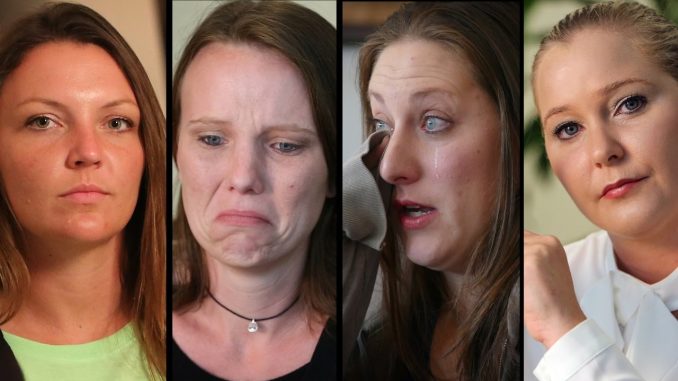
Victims of Jeffrey Epstein share the emotional toll that sexual abuse has taken on them — even years after the abuse occurred. Miami Herald reporter Julie K. Brown interviewed the young women, most speaking for the first time about Epstein. By
In what one lawyer called ”a historic day for crime victims in America,” more than a dozen women — and perhaps as many as three dozen — who were sexually abused by sex trafficker Jeffrey Epsteinare expected to testify in a New York courtroom, giving them a voice that they were deprived of by federal prosecutors more than a decade ago when they were abused by him as teenagers.
The hearing, before U.S. District Judge Richard M. Berman, will mark the first time many of the victims will be able to speak about the betrayal they’ve felt at the hands of federal prosecutors, who gave Epstein a secret plea deal in 2008. It’s also the first time that they are able to talk about the financier’s death in a federal prison two weeks ago.
Palm Beach multimillionaire Jeffrey Epstein has been a free man, despite sexually abusing dozens of underage girls according to police and prosecutors. His victims have never had a voice, until now.
“I can’t say that I’m pleased he committed suicide, but I am at peace knowing he will not be able to hurt anyone else,’’ said one of his victims in a written statement released Tuesday by her lawyer, Lisa Bloom.
Bradley Edwards, one the attorneys who brought a precedent-setting crime victims’ rights case on behalf of the women, said Tuesday’s proceeding will be “a historic day for crime victims in the United States.“
He continued: “This hearing has great significance. While it does not provide complete closure, it solidifies the fact that victims are an integral part of the process,’’ he said.
It’s unclear exactly how many women will appear at the hearing, which is a mechanism for federal prosecutors in New York to formally drop the sex trafficking case against Epstein, who who was found dead in his jail cell on August 10, one week after he was removed from suicide watch.
Attorney General William Barr has ordered a federal investigation into his death, which the medical examiner ruled a suicide.
Geoffrey Berman, U.S. attorney for the Southern District of New York, has said he intends to pursue federal charges against the co-conspirators Epstein used to recruit girls and young women around the country and abroad. Among those suspected of helping him is Ghislaine Maxwell, a British socialite and daughter of the late publishing tycoon Robert Maxwell. Maxwell has denied the allegations.
The case was first investigated by Palm Beach police beginning in 2005. It wound through the criminal justice system, ending with the FBI and the U.S. attorney in Miami at the time, Alexander Acosta. The Miami Herald, in a three-part series published this past November, reconstructed the case by analyzing the dozens of civil suits filed over the past decade. The Herald also identified more than 80 women who alleged they were abused by Epstein, interviewing about a dozen of them for the series. Four of them spoke on the record and on video.
At least two of the women who were part of the series are expected to testify Tuesday.
As a result of the series, and subsequent stories that followed further scrutinizing the case, Acosta — appointed U.S. secretary of labor by President Trump in 2017 — was forced to resign.Epstein, who had returned to his jet-setting life after a short jail term, was arrested on new federal charges in July.
There are two federal investigations into the case as well as a criminal probe in Florida, where Epstein abused many of the girls from 1997 to 2006, court records show. The victims, most of whom were 13 to 16 years of age, were recruited from schools, spas and malls as part of a sexual pyramid-like operation in which they were offered money in exchange for giving him massages. The massages sometimes turned into sexual assaults.
In February, a federal judge in Florida ruled that Epstein’s 2008 plea deal was negotiated in violation of the federal Crime Victims’ Rights Act, which requires federal prosecutors to take certain steps to involve victims in the criminal justice process. In this case, the judge found that prosecutors deliberately hid the plea deal from Epstein’s victims, sealing the agreement so that no one, including the victims and the public, would learn about it until months after the case was closed.
The non-prosecution agreement called for Epstein to serve little more than a year in the Palm Beach County Jail. During his incarceration, he was allowed to leave his jail nearly every day, spending up to 12 hours in a luxurious office he set up in West Palm Beach.
One woman has recently come forward to allege that Epstein had a sexual encounter with her and another woman in his office during the time he was provided “security” by plainclothes members of the Palm Beach Sheriff’s Office. Epstein was allowed to hire the deputies, paying them to escort him to and from jail during his 13 months of incarceration. Questions have been raised about how a convicted sex offender of young girls was allowed work release, some of that time spent behind closed doors unsupervised, records show.
Florida Gov. Ron DeSantis has ordered an investigation into whether laws were broken by sheriff’s deputies and others in the jail who gave him special treatment.
*story by the Miami Herald